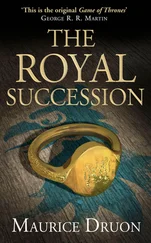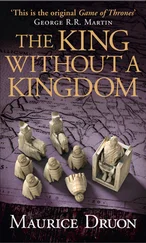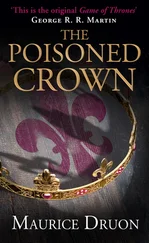While the French prelates had all donned their mitres for the Council, Orleton was merely wearing a violet silk travelling-cap with ermine earlaps. Robert noted this with satisfaction; it would diminish the English bishop’s authority when his turn came to speak.
‘Monseigneur of Valois will be voted Regent,’ he whispered to Orleton, as if confiding a secret to a friend.
Orleton made no reply.
At last the one missing member of the Council, for whom they had all been waiting, arrived. It was the Countess Mahaut of Artois, the only woman to be present. Mahaut had aged; she leaned on a stick and seemed to move her massive body with difficulty. Her hair was quite white and her face a dark red. She included all the company in a vague greeting and, when she had sprinkled the corpse with holy water, seated herself heavily beside the Duke of Burgundy. She seemed to be panting for breath. 4
The Archbishop and Primate, Guillaume de Trye, rose, turned towards the royal corpse, slowly made the sign of the cross, and then stood for a moment in meditation, his eyes raised towards the vault as if seeking Divine inspiration. The whisperings ceased.
‘My noble lords,’ he began, ‘when there is no natural successor upon whom the royal power can fall, that power returns to its source which lies in the assent of the peers. Such is the will both of God and of Holy Church, which sets an example by electing the sovereign pontiff.’
Monseigneur de Trye spoke well and with a preacher’s fine eloquence. The assembled peers and barons had to decide on whom they would confer temporal power in the kingdom of France, first for the exercise of the Regency and then, for it was only wise to look to the future, for the exercise of kingship itself, should the most noble lady, the Queen, fail to give birth to a son.
It was their duty to appoint him who was the best among equals, primus inter pares , and also nearest in blood to the Crown. Was it not in similar circumstances in the past that the temporal and spiritual peers had entrusted the sceptre to the wisest and strongest among them, the Duke of France and the Count of Paris, Hugues I, the Great, founder of the glorious dynasty?
‘Our dead Sovereign, who is still with us this day,’ continued the Archbishop, slightly inclining his mitre towards the catafalque, ‘wished to direct our choice by recommending to us, in his will, his nearest cousin, that most Christain and most valiant Prince, who is in every way worthy to govern us and lead us, Monseigneur Philippe, Count of Valois, Anjou and Maine.’
The most Christian and most valiant Prince, who felt his ears buzzing with emotion, was uncertain what attitude to adopt. Modestly to lower his long nose might imply that he doubted both his capacity and his right to rule. But to hold it up proudly and arrogantly might prejudice the peers against him. He therefore sat perfectly still, not even a muscle of his face twitching, with his eyes fixed on his dead cousin’s golden boots.
‘Let each of us consult his conscience,’ concluded the Archbishop of Reims, ‘and give his counsel for the general good.’
Bishop Orleton got quickly to his feet.
‘I have already consulted my conscience,’ he said. ‘I have come here to represent the King of England, Duke of Guyenne.’
He had considerable experience of meetings of this kind, where the decisions to be taken had been secretly arranged beforehand, but where everyone nevertheless hesitated to be the first to speak. He was quick to take advantage of it.
‘In the name of my master,’ he went on, ‘I am to declare that the person most nearly related to the late King Charles of France is his sister, Queen Isabella, and that the Regency should therefore be vested in her.’
With the exception of Robert of Artois, who was expecting something of the sort, the Council was for a moment utterly astounded. No one had considered Queen Isabella during the preliminary negotiations, nor had anyone for an instant imagined that she would make a claim. They had quite forgotten her. And now here she was emerging from the northern mists through the voice of a little bishop in a fur cap. Had she really any rights? They all looked questioningly at each other. If strict considerations of lineage were to be taken into account, it was clear that she had undoubted rights; but it seemed sheer folly to claim them.
Five minutes later, the Council was in considerable confusion. They were all talking at once and at the tops of their voices, paying no heed to the presence of the dead King.
Had not the Duke of Guyenne, in the person of his ambassador, forgotten that women could not reign in France, in accordance with the law that had been twice confirmed by the peers in recent years?
‘Is that not so, Aunt?’ Robert of Artois asked maliciously, reminding Mahaut of the time when they had been violently opposed over the Law of Succession which had been promulgated in favour of Philippe the Long, the Countess’ son-in-law.
No, Bishop Orleton had forgotten nothing; in particular, he had not forgotten that the Duke of Guyenne had been neither present nor represented – no doubt because he had been deliberately informed too late – at the meetings of the peers at which the extension of the so-called Salic Law to the Crown had been so arbitrarily decided, and that in consequence he had never ratified the decision.
Orleton had none of the unctuous eloquence of Monseigneur Guillaume de Trye; he spoke a rather rough and somewhat archaic French, for the French used as the official language of the English Court had remained unaltered since the Conquest, and it might well have raised a smile in other circumstances. But he was adept at legal controversy and never at a loss for a retort.
Messire Mille de Noyers, who was the last surviving jurisconsult of Philip the Fair’s Council and had played his part in all the succeeding reigns, had to come to the rescue.
Since King Edward II had rendered homage to King Philippe the Long, it was evident that he had recognized him as the legitimate king and had therefore, by implication, ratified the Law of Succession.
Orleton did not see the matter in that light. Indeed, it was not so, Messire! By rendering homage, Edward II had merely confirmed that the Duchy of Guyenne was a vassalage of the Crown of France, which no one denied, though the terms of this vassalage still remained to be defined after more than a hundred years. But this was irrelevant to the validity of the procedure by which the King of France had been chosen. And, in any case, what was the question in dispute, was it the Regency or the Crown?
‘Both, both at once,’ said Bishop Jean de Marigny. ‘For, as Monseigneur de Trye so rightly said: it is wise to look to the future; and we do not want to be confronted with the same problem again in two months’ time.’
Mahaut of Artois was trying to get her breath. Ah, how infuriating this ill-health was, and the singing in the head that prevented her thinking clearly. She disapproved of everything that was being said. She was opposed to Philippe of Valois because to support Valois meant supporting Robert; she was opposed to Isabella whom she had long hated because, in the past, Isabella had denounced her daughters. After a while, she managed to intervene in the discussion.
‘If the crown could go to a woman, it would not be to your Queen, Messire Bishop, but to none other than Madame Jeanne la Petite, and the Regency should be exercised by her husband, Messire of Evreux here, or her uncle, Duke Eudes, here beside me.’
There were signs of excitement on the part of the Duke of Burgundy, the Count of Flanders, the Bishops of Laon and Noyon, and even in the attitude of the young Count of Evreux who, for an instant, thought: ‘Why not, after all?’
Читать дальше












